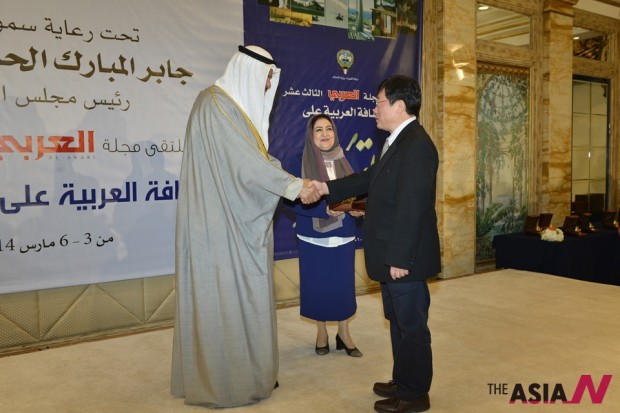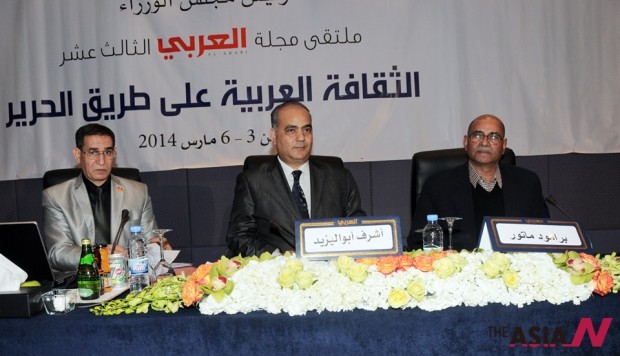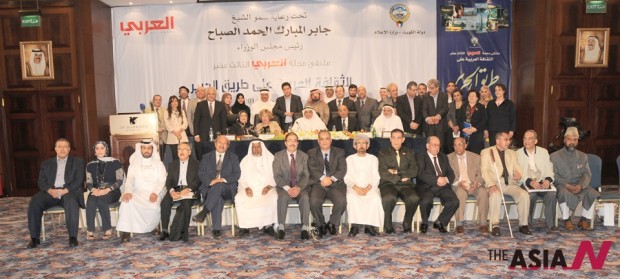Kuwait, future bridge of Silk Road
The 13th Al-Arabi Magazine Forum held on March 3-5
The two TV announcers Ms. Manal Omran and Ms. Sodaba Ali were calling the honored names and institution representatives to receive their golden boats from the Minister of Information and Minister of State for Youth Affairs Sheikh Salman Sabah Salem Al-Humoud Al-Sabah, who stood next to Dr. Laila Khalaf Al-Sabaan, the Editor-in-chief of Al-Arabi Magazine, which organzied the Al-Arabi XIII Forum, “The Arabic Culture on the Silk Road.” They presented, “… and now, AJA Culture and Media, South Korea, is to be honored, for its continuous role in bridging Arab and Asian cultures, and the honorary shield is received by Mr. Lee Sang-ki, its founder.”
Mr. Lee was among the seven honorees that were given the golden boat carrying two signs: one the flag of Kuwait, and the other with the word “Silk Road” written in Arabic. The others awardees were Prince Bandar Bin Khalid Bin Faisal Al Saud, Chairman of the Board of Trustees of the Arab Thought Foundation, Saudi Arabia, Abdulaziz Saud Al-Babtain, Chairman of the Board of Trustees of Abdulaziz Saud Al-Babtain, Prize of Poetic Creativity, Kuwait, Dr. Mufid Shehab, former Minister of Higher Education, Arab Republic of Egypt, The Global Council of the Arabic Language, the Republic of Lebanon, represented by Dr. Hussein Atwi, the State Theater, the Republic of Tatarstan, Russian Federation, for its role in supporting the cultures of the Silk Road since its inception about a century ago, represented by researcher and translator Mrs. Elmira Bayrem Ali, a Tatar from the Crimean who works in Kamal State Theatre of Tatarstan. The last name honored was Dr. Sayed Jahangir, professor of Arabic literature at the English & Foreign Languages University in Hyderabad, India, for his role in the publication of the Arabic language in the country.
Mr. Lee Sang-ki was not the only AJA member who joined the forum, as we had director Pramod Mathur from India, of whom I introduced two of his documentary films. One of them was known by a nickname “The Ice Man,” and was about the life of an engineer living in Kashmir who could build an artificial glacier in the shadow of the Himalayan Mountains to save water for months until needed by the farmers. The film entitled “Beyond Prayer,” was directed by Neelima, Mathur’s wife.

Lee Sang-ki shakes hands with Kuwait Minister of Information and Minister of State for Youth Affairs Sheikh Salman Sabah Salem Al-Humoud Al-Sabah, and Dr. Laila Al-Sabaan holds his Golden Boat. (Photo : Mohammed Kasif)
History and future of Silk Road
AJA correspondents from Tunisia and Morocco also attended the forum: Mr. Khalid Sulaiman and Mr. Abdul-Rahim Al-Allam. Mrs. Fatima Al-Zahraa, The AsiaN advisor and columnist, was also among the AJA members who joined the 3-day forum from March 3-5, 2014. Editor-in-Chief of Al-Hilal, one of the partner publications of The AsiaN and Magazine N, Mr. Mohammed Al-Shafei, was also there. It gave me a feeling that we were in Seoul attending an AJA meeting, especially when we were joined by Ms. Choi Jiyoung, a fashion director from the heart of Gangnam, and the young Korean interpreter Ms. Madiha, as known in her Arabic class.
For the three days of the forum, Kuwait relived the ancient days of the Silk Road again, as more than 82 researchers, intellectuals and media members came together from 21 countries, representing 18 nationalities.
The researchers presented 22 papers during eight sessions and four free evenings were for music and the cinema. Two albums were printed for the occasion: the first being “Tatars, The Way to the Roots” by photographer Rifhat Yakupov (Tatarsan, Russian Federation) and the second about the footsteps of the Al-Arabi Magazine on the Silk Road, an exhibition of more than 70 photos by photographer Sulieman Haider and writer Ibrahim Al-Mulaifi.

Ashraf Aboul-Yazid introduces Basheer Ayyad (Egypt), and Pramod Mathur (India) (Photo : Mohammed Kasif)
In his opening speech, Sheikh Salman Sabah Salem Al-Humoud Al-Sabah said: “Today you are on the Silk Road, and this is not something of a rhetorical metaphor, but is a historical fact. The State of Kuwait’s geographical location at the heart of travels during the ancient world is enough to tell you about the site and history of the island (Failaka), which accounted for a commercial plant and important sea route between civilizations of Mesopotamia and the Gulf Coast ports of the Arab civilizations. It is even considered the first urban center in the area since around 3000 BC.”
H.E. Al-Sabah pointed out that a Greek historian in 170 BC named that certain island as Icarus by Alexander the Great, who named it after the Greek island of the same name in the Aegean Sea.
“Since that date, and to this day, we could see the presence of Failaka Island on the maps sketched by travelers.”
In her speech, Dr. Laila Al-Sabaan narrated the brief history of the Silk Road, and, later, in the first session, she explained the mega future project of Kuwait to be held under the name of “The Silk City.” She offered the other cultural side of the economic project.
Three papers completed the first two sessions: “The Travels of Marco Polo” by Dr. Tariq Ramadan, “Manuscripts on the Silk Road,” by Dr. Nayef Shamrookh, and “The Importance of Manuscript Libraries” by Dr. Saud Al-Osfour.
The 8-minute opening film’s theme and title was “The Art of Maqam Music on the Silk Road.” Most of the footage I used to produce the film was taken in the city of Kashgar, Xinjiang, northwest of China, where the most famous gate of the Silk Road from China to the world was. This city still retains the ancient art, which I observed when visiting for the last time 5 years ago.
In my paper presented at the forum, I wrote on the pictorial Silk Road internet, explaining how the world web became the storage of the Silk Road memories.

































































